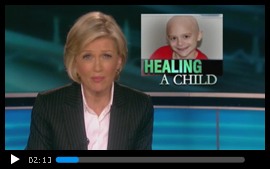
Medical Mission Trips
Kenyatta National Hospital in Nairobi, Kenya – June 2014
On June 22 I arrived in Nairobi, Kenya for an 8 day medical mission trip at the Kenyatta National Hospital with my wife (Emina) and three sons, my physician assistant (Jerry) and his son, Dr. Jeff Coe, and a team from Nuvasive (David, Paul, and Pitchou). It was a life-changing experience for me. I know we touched the lives of many while we were there, but they had an equally profound impact on my family and me.
Our mission trip to Kenya was amazing. My goals for this trip included the following: 1) Help as many people as possible with our knowledge and abilities; 2) Teach local spine surgeons how to provide modern spine care in a developing country; and 3) Expose my wife and kids to the joy of helping and giving to others. These goals and more were easily attained as the people in Nairobi had really bad problems with very little access to health care. The local spine surgeons in Nairobi are a part of a special training program envisioned by the Congo native Pitchou Malaba and supported by the Nuvasive Spine Foundation (NSF). Their mission is to train surgeons in Africa to perform ethical and modern spine surgery. They started in Kenya with Drs. Richard Ombachi and Soren Otieno 3.5 years ago with quarterly mission trips from US spine surgeons. Pitchou and the NSF can now proudly say that they really accomplished their goal to teach the doctors in Kenya how to perform miraculous spine surgery in Kenya.
On our first day, we saw approximately 50 patients who travelled from all over the country to see if they could be treated by our team. The local surgeons already pre-screened each of the patients and determined that these patients would benefit from surgery. It was immediately evident that the doctors in Kenya were very well trained as nearly every patient had a very bad problem that would benefit from surgery. Virtually every patient had a severe spinal deformity, spinal instability, or severe compression of the spinal cord or nerves. These are problems that truly benefit from modern and conventional spine surgery. This is very different than our clinics in the States where we often see patients who were aggressively treated with surgery for problems that would have healed more naturally without surgery.
Normally, the spine surgeons in Kenya have one operating room per week where they can perform 2 to 3 operations that day. However, the Departments of Orthopaedic surgery and Anaesthesiology dedicated 2 operating rooms each day for 4 days during this mission trip, which allowed us to help more people. We did not have the resources or time to help everyone, so we had to prioritize the patients in order from more serious to less serious. We ultimately gave the patients with more imminent risk of paralysis or worsening infection the highest priority and treated them. Unfortunately, we could not even get to the patients with the most severe deformities, as these patients were not at as high a risk for paralysis or death so they had to wait until the next available operating room or mission trip.
Our remaining days were spent fixing the patients. We had two surgeons, Jeff Coe, MD and me, working with Drs. Ombachi, Otieno and Fazal. My PA, Jerry, and Pitchou facilitated the flow of the operating rooms as well as assisted with surgery and monitored the function of the nerves during the operations. Our representatives, Paul and David, from the States prepared all the proper equipment for us to help with the operations. By the end of the week, this incredible team successfully completed one and a half months of work in 4 days. Each operation ended well and all of our patients were alive and moving their arms and legs.
This portion of the trip accomplished our number one goal. More importantly for me, it made me happy and proud to be a doctor and a surgeon. The gift of giving is an inexplicable feeling, but one that is magnified 1000 fold in this type of environment. The patients are so appreciative. Their smiles are so big. Their hugs are so strong. Their joy is so genuine.
While we were in the operating room, Emina, my sons, Jerry’s son and David’s wife painted the orthopedic pediatric ward and played with the kids admitted to the floor. The kids on the floor were so excited to have visitors. They expressed joy and gratitude through their beautiful smiles and precious eyes, despite their amputated limbs, broken bones, and enlarging bone cancer. On the last day of the mission, we had a gift giving ceremony for the kids. I’m told that they loved the clothes, books, toys, trinkets, and beads. I’m sure it was like Christmas day on steroids.
We also had the opportunity to visit an English lower and upper school in Kibera, which is the largest urban slum in Africa. The drive into the slum was surreal. It felt like we were in a scene from the movie Slum Dog Millionaire. Poverty was all around with evil eyes with piercing gazes into our van as we drove deeper into the slum. We finally arrived at the school and it was a relative oasis. Kids in uniforms crowded onto benches lined across small 15′ x 15′ rooms sitting obediently through their lessons. It was an amazing sight. We gave them school supplies and they sang us songs. Perhaps the most exciting thing for me was to have the opportunity to give them Luminaid lamps. These lamps are foldable, water resistant solar powered pocket-sized lamps that blow up and provide light for the kids to study. We had about 30 lamps that were supplied by SETRE, our non-profit Spine and Extremity Tumor Research Endowment, and the Luminaid group. I think that all of us left the school amazed at the joy and happiness that these kids and teachers have despite living in conditions we consider deplorable.
Perhaps the most important thing we learned from this mission was taught to us by Pitchou. He told us of his amazing escape from the persecution of his people in the Congo and his near death experience on a crowded, corrupt, deadly train ride across the country to a refugee camp where he lived for 5 years. He came to America when his friend called him and said, “Hey Pitchou. You have to come here. America is the easiest country in the world. All you have to do is go to school and you get a job.” His friend lent him $5,000 to come here and he took the bull by the horns and made the most of it. He finished school,became a neurophysiologist, wrote and sold software that allows doctors to remotely monitor nerve function, was placed in charge of spine operations for Nuvasive in Africa, organized mission trips to train surgeons in Africa to help others, and the list of his accomplishments goes on and on. To him, “Life in America is easy.” Go to school. Work hard. Everything else follows. He taught us his problem free philosophy (Hakuna Matata). He didn’t preach this meaning to us. He lived it. His life story is amazing and he truly lives up to the promise to himself to “Stop asking WHY things are happening to you, but instead ask yourself HOW you can make the situation better.” He was and is an inspiration to me and everyone on the trip.
Our mission trip was awesome. Our goals were accomplished. God has blessed me with the passion, knowledge and skill to help others. It makes me feel good. It makes me happy. Experiencing this joy with my family and friends made this once in a lifetime opportunity even better than I could have imagined.
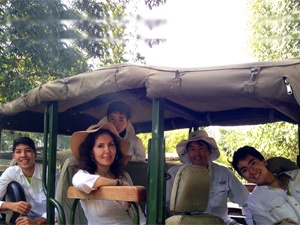 |
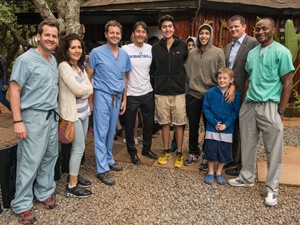 |
| We got to enjoy an amazing Kenya safari before heading home | From left to right – David, Emina, Paul, Dr. Marco, Brandon, Noah, Kyle, Thomas, Jerry, Pitchou |
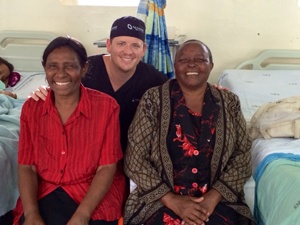 |
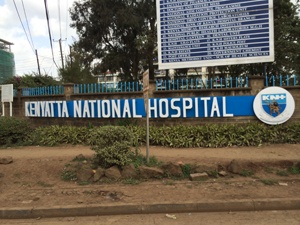 |
| Jerry, Dr. Marco’s PA, with two patients | Kenyatta National Hospital |
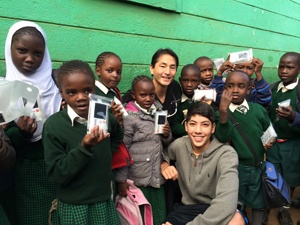 |
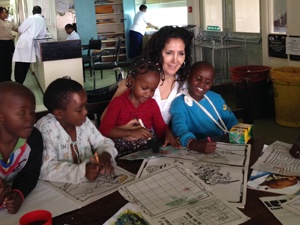 |
| Dr. Marco and one of his sons with the Kibera school children and their new Luminaid lamps | Emina, Dr. Marco’s wife, coloring with the children in the hospital |
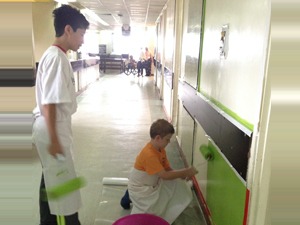 |
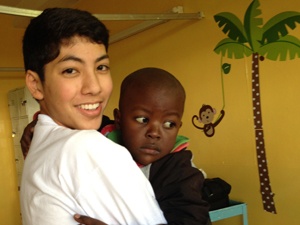 |
| Jerry’s son and Dr. Marco’s youngest son painting the children’s wing of the hospital | Dr. Marco’s middle son playing with a pediatric patient |
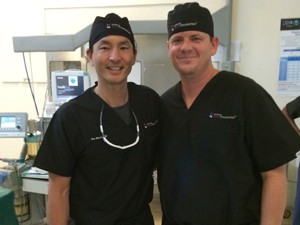 |
 |
| Dr. Marco and Jerry in the operating room at Kenyatta National Hospital | Jerry, Dr. Marco, and Dr. Marco’s oldest son painting the walls of the children’s wing at Kenyatta National Hospital |
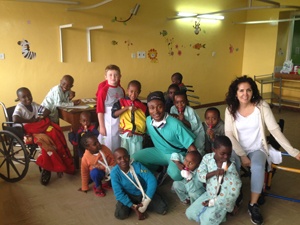 |
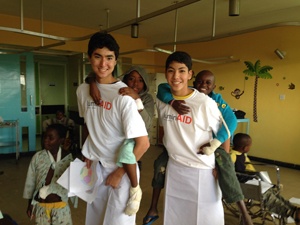 |
| Pitchou, Emina (Dr. Marco’s wife), and Jerry’s son visiting with the pediatric patients | Dr. Marco’s sons giving piggy back rides to the pediatric patients |
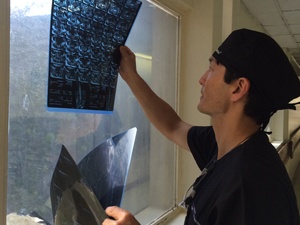 |
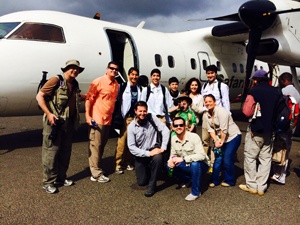 |
| Dr. Marco reiveiwing a patient’s films in preparation for surgery | The group boarding a plane to go on a safari before heading back to Texas |
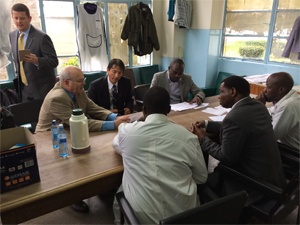 |
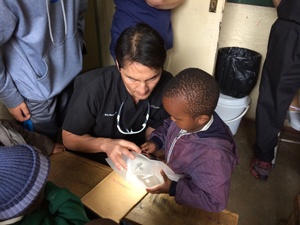 |
| Surgeons reviewing patient records and deciding which ones are in the most dire need of surgery | Dr. Marco teaching a young student at the school in Kibera how to use his new Luminaid lamp |
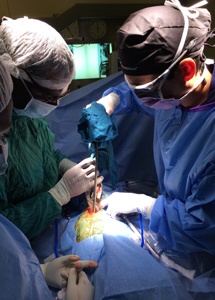 |
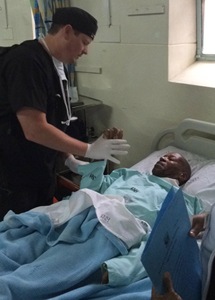 |
| Dr. Marco performing surgery | Jerry visiting with a patient after surgery |
Haiti Earthquake – March 2010
“Orthopedic surgeon keeps tabs on earthquake victims in Haiti”
“Blessed with the ability to help people”
Palestinian Children’s Relief Fund – July 2012
Deformity Program










 Read More
Read More
 Location Map
Location Map Patient Testimonials
Patient Testimonials Insurances
Insurances
